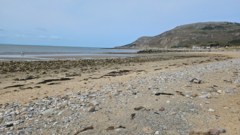Is Raw Sewage Polluting Our Beaches?

Addressing Raw Sewage Incidents at North Wales Beaches: A Growing Concern
In recent weeks, the picturesque beaches of North Wales have faced a troubling issue: raw sewage seeping onto the shores, particularly at West Shore in Llandudno. This alarming situation has sparked concerns from local representatives and the community alike, especially during the busy summer holidays when families flock to the beach. With the incident raising questions about infrastructure and environmental safety, it's essential to delve deeper into the implications of sewage leaks and the measures needed to prevent them in the future.
The Incident: What Happened at West Shore?
The incident came to light when Janet Finch-Saunders, a Member of Senedd representing Aberconwy, reported that sewage was visibly leaking onto the beach. This unfortunate event occurred at the Dale Road car park, where the sewage supposedly seeped from under a roller-shutter door of the pumping station. Local beachgoers expressed their disgust and concern over the health risks posed by such contamination, especially during a time when many families are enjoying the sun and swimming in the sea.
Welsh Water's Response
In response to the incident, Welsh Water stated that the leak was caused by a blockage, specifically the accumulation of wet wipes and other non-flushable materials. According to the utility company, the “foul water” did not enter any watercourses, which they claim mitigated the environmental impact. However, they acknowledged the seriousness of the situation, particularly in light of the summertime influx of tourists and residents eager to enjoy the beach.
The Call for Action
Finch-Saunders expressed her concerns directly to Welsh Water, advocating for increased investment in pumping station infrastructure to prevent such incidents from recurring. "This is not acceptable," she emphasized, highlighting the implications for local businesses and families. The peak tourist season places additional pressure on local facilities, making reliable sanitation services all the more critical.
The Importance of Proper Waste Disposal
The unfortunate blockage that led to the sewage leak raises important questions about wastewater management and public awareness regarding proper disposal practices. Welsh Water has reminded the public to only flush waste that is safe to dispose of in toilets—namely, toilet paper. Items such as wet wipes, sanitary products, and even cotton swabs can contribute significantly to plumbing issues and blockages.
Understanding Sewer Abuse
Sewer abuse, the term used to describe the improper disposal of waste, is a growing concern across many regions. Welsh Water estimates that this issue costs the company approximately £5 million annually, highlighting the financial burden of inadequate waste management practices. By raising awareness and educating the public about the dangers of flushing inappropriate materials, utilities can reduce blockages and protect both the environment and public health.
Community Impact
The impact of sewage leaks extends beyond mere inconvenience; it poses significant health risks and can harm local ecosystems. For communities dependent on tourism, like Llandudno, incidents like this can deter visitors, leading to economic losses for local businesses. Residents and stakeholders must work together to ensure that proper measures are in place to protect both the environment and the community.
Preventative Measures and Future Recommendations
To prevent future occurrences of sewage leaks, a multifaceted approach is needed. Here are several recommendations that can help mitigate the risks associated with wastewater management:
- Infrastructure Investment: Utility companies, like Welsh Water, must prioritize investment in pumping stations and wastewater treatment facilities. Routine maintenance and upgrades can prevent blockages and ensure reliable service.
- Public Awareness Campaigns: Initiatives aimed at educating the public about what can and cannot be flushed can significantly reduce instances of sewer abuse. Engaging local schools, community groups, and businesses in these efforts can amplify their reach.
- Regular Monitoring: Implementing a system for regular monitoring of pumping stations and sewer lines can help identify potential problems before they escalate into serious issues.
- Collaboration with Local Authorities: Partnerships between utility companies and local governments can foster a more robust response to sewage management challenges. Together, they can develop policies that prioritize environmental safety and public health.
The Role of Local Government
The role of local government is crucial in addressing these challenges. By working with utility companies and community stakeholders, they can create policies that support sustainable waste management practices. Regular assessments of local infrastructure can help identify areas needing upgrade or repair, ensuring that public health is safeguarded.
Engaging the Community
Community engagement is vital for successful waste management. Local initiatives, such as beach clean-up events and educational workshops, can raise awareness about the importance of proper waste disposal and environmental stewardship. Encouraging residents to take an active role in caring for their local environment fosters a sense of ownership and responsibility.
FAQs about Sewage Management and Beach Safety
What should I do if I see sewage on the beach?
If you encounter sewage on the beach, it's crucial to report it to local authorities immediately. They can take the necessary steps to address the issue and ensure public safety. Avoid swimming or coming into contact with the contaminated water until it has been deemed safe.
How can I help prevent sewage leaks in my community?
One of the most effective ways to prevent sewage leaks is to educate yourself and others about proper waste disposal. Avoid flushing non-flushable items and encourage family and friends to do the same. Participating in community clean-up events can also help keep local waterways clean.
What are the health risks associated with sewage leaks?
Sewage leaks can pose serious health risks, including exposure to harmful bacteria and pathogens. Swimming in contaminated water can lead to gastrointestinal illnesses, skin infections, and respiratory issues. It's essential to heed warnings from local authorities about water safety during such incidents.
Conclusion: A Call for Action and Awareness
The recent sewage leak at West Shore in Llandudno serves as a critical reminder of the importance of effective wastewater management and community awareness. As local representatives like Janet Finch-Saunders call for infrastructure improvements, it’s essential for everyone to play their part in preventing such incidents. Public education, community engagement, and collaboration between utility companies and local governments are vital steps toward protecting our beaches and ensuring a safe, enjoyable environment for everyone.
As we move forward, let’s reflect on how we can contribute to the health of our local environments. Are you taking the necessary steps to ensure proper waste disposal in your community? #WasteManagement #BeachSafety #CommunityEngagement
Published: 2025-08-06 18:15:15 | Category: wales



